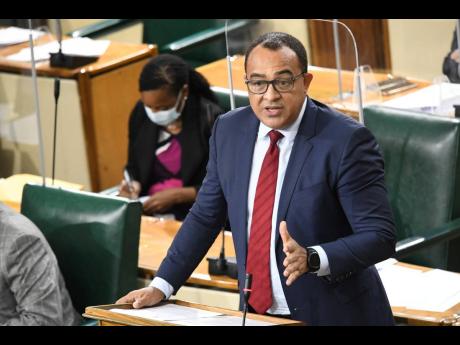Sugary drinks still flowing
Schools, health facilities disregard ban on beverages high in sugar
Associate Editor – Investigations Schools and public health facilities are failing to observe the phased sugary drinks ban introduced by the Government just over three years ago that was largely designed to improve the health of the nation’s...
Associate Editor – Investigations
Schools and public health facilities are failing to observe the phased sugary drinks ban introduced by the Government just over three years ago that was largely designed to improve the health of the nation’s children and address Jamaica’s struggle with non-communicable diseases (NCDs).
This was the main finding of a Sunday Gleaner probe into the observation of the government policy, which took effect on January 1, 2019, a joint effort involving the country’s Ministry of Education and the Ministry of Health and Wellness.
Twenty institutions were included in our investigation across four parishes – 16 early childhood, primary, preparatory and secondary schools and four public health facilities in St Andrew, St Catherine, Clarendon and St James.
According to the Cabinet-approved Interim Guidelines for Beverages in Schools prepared by both ministries, sweetened beverages would be deemed as being in excess of the sugar limit and prohibited from being sold or served in schools, if the total sugar concentration exceeded five grams per 100 millilitres as at January 1, 2019.
By January 1, 2021, the limit of five grams per 100 millilitres took effect.
Four grams per 100 millilitres was the target for January 1, 2021, before settling at 2.5 grams per 100 millilitres, as of January 1, 2023.
However, Dunstan Bryan, permanent secretary in the Ministry of Health and Wellness, said the January 1, 2021 sugar concentration limit was never implemented, because of the COVID-19 pandemic.
“We initiated in 2019, but the sequential reduction in the [sugar concentration] volume of the products sold at schools did not go pass the 2020 limit. We were not able to do the audits to guide the schools, so, at this point in time, we would not have moved to the implementation of the third limit, because schools were out. It would not have been reasonable to have assumed that schools could have implemented the policy,” he told The Sunday Gleaner.
When asked if schools were advised about the delay in the scheduled implementation, Bryan said that no formal instructions were issued, as the focus would have been on getting the country through the global health crisis and the nation’s children back to face-to-face classes.
“It was not an oversight. It would be understandable, I believe, to have that sort of gap in policy implementation,” he said.
According to Bryan, the policy is still in place and schools and public health facilities should be guided by the January 1, 2020 limit of five grams per 100 millilitres, which took effect two months before the first case of COVID-19 was confirmed in the island.
The Interim Guidelines also stated that the monitoring of the sugary drinks ban would have occurred with the help of parish nutritionists and dietitians, who were required to submit school nutrition and physical activity audits.
“We at MOH (Ministry of Health) will conduct our assessment to ensure we can help schools comply with the policy. Not only the schools, but the manufacturers also, who need to change their formulation. It would have been unreasonable to have expected manufacturers and the school community to have been in alignment with the policy,” Bryan said.
MANY IN BREACH
During our probe, concessionaires on the compounds, or vendors on the outside of almost all 20 institutions, were in breach of the 5g/100ml sugar concentration restriction.
The ban was announced by Health Minister Dr Christopher Tufton during his Sectoral Debate presentation in Parliament in 2018. At that time, he noted that there was evidence that excessive consumption of drinks with added sugar contributed to the prevalence of NCDs.
He argued then that Jamaicans should be worried about the health of teenagers, based on the statistics available at that time. The health minister noted that approximately 70 per cent of Jamaican children consume one or more sugar-sweetened beverages per day, and that the prevalence of obesity in adolescents 13 to 15 years increased by 68 per cent and had doubled in boys over a period of seven years.
The situation remains dire in 2022.
Just last week, Tufton bemoaned the health status of the nation while speaking at a media conference.
“We have a sick population and sick in terms of [being] clinically ill, in terms of underlying conditions. One in three Jamaicans are hypertensive – high blood pressure – one in eight diabetic, [and] one in two obese or overweight, increasing their risk of developing a lifestyle or non-communicable disease. Those are the realities, not an opinion,” Tufton said.
He said that the prevalence of NCDs in the population was reflected in the island’s COVID-19 death rate, noting that fatalities among persons with such pre-existing conditions were alarmingly high.
The sugary drinks ban was not just for schools, as public health facilities were also called upon to lead by example, with Tufton then noting that administrators at the institutions would be a “critical part of the enforcement”.
He also made it clear that the ban on the sale of overly sweetened beverages would also apply to vendors on the perimeter of early childhood, primary and high school compounds.
The health minister also said that he was amassing an army of watchdogs, including 100 public-health dieticians and nutritionists, as well as guidance counsellors and principals, to monitor, enforce and encourage behavioural change.
But he accepted then that there would be resistance.
When contacted for a reaction to the findings of The Sunday Gleaner sugary drinks probe, Tufton reiterated that the pandemic affected the implementation of the policy.
“I had asked for an audit/assessment by parish health teams since the resumption of face-to-face classes, and this is currently being done. I have not yet received the report. With almost two years of no face-to-face [classes], we did expect anomalies to a policy that was relatively recent and where there was no ongoing inspection due to COVID and no classes,” he noted in written responses to The Sunday Gleaner.
The health minister said the intention is to use the results of the audit to determine a specific strategy for implementation going into the new school year, come September.
“MOHW (Ministry of Health and Wellness) will be working with the MOEY (Ministry of Education and Youth) to manage enforcement, since they have the jurisdictional authority over schools. Myself and [Education] Minister Fayval Williams have discussed this issue. On Tuesday, in my Sectoral [Debate presentation], I will speak more to additional plans to address other health-related activities for our young people, a critical focus this financial year,” Tufton said.
QUITE DISAPPOINTING
Linvern Wright, president of the Jamaica Association of Principals of Secondary Schools, also advanced the view that the pandemic, which forced the closure of schools for an extended period, might have affected the observation of the sugary drinks ban.
“Nobody really paid attention to that during COVID. ... Never heard of it as a front-burner issue. I guess, because we are coming out of COVID, … it’s not something that we monitored. I am aware of the ban, but not aware of breaches or if people are complying,” said Wright, who is also the principal of the William Knibb Memorial High School in Trelawny.
However, Wright accepted that breaches should not be ignored.
“If that is going on, it is a concern in terms of the nutrition of the kids. It is just something that I think we just have to shake up on, if it is that it’s happening, in terms of monitoring,” Wright said.
He added: “I wouldn’t blame anyone to say they didn’t remind us … . I know the initial announcement was done and the fanfare around it. I don’t know that there was any follow-up in relation to that.”
Meanwhile, Jamaul Hall, president of the National Secondary Students’ Council, called for regular checks to prevent breaches of the sugary drinks ban and for a public education campaign to promote the policy.
The Grade 13 Munro College student also said punitive measures are needed.
“I would also call for sanctions for school administrators who continue to disregard the policy that’s currently set in place, as well as vendors who continue to make such sales on or off school grounds,” said Hall.
“I would consider that rather poor implementation. [It’s] quite disappointing, if the findings of your investigation are true. It is more life-threatening than just a child drinking a soda. A soda a day can lead to lifestyle illnesses such as diabetes,” said the students’ council president.
The Ministry of Education and Youth did not respond to The Sunday Gleaner’s request for comments on the findings.



